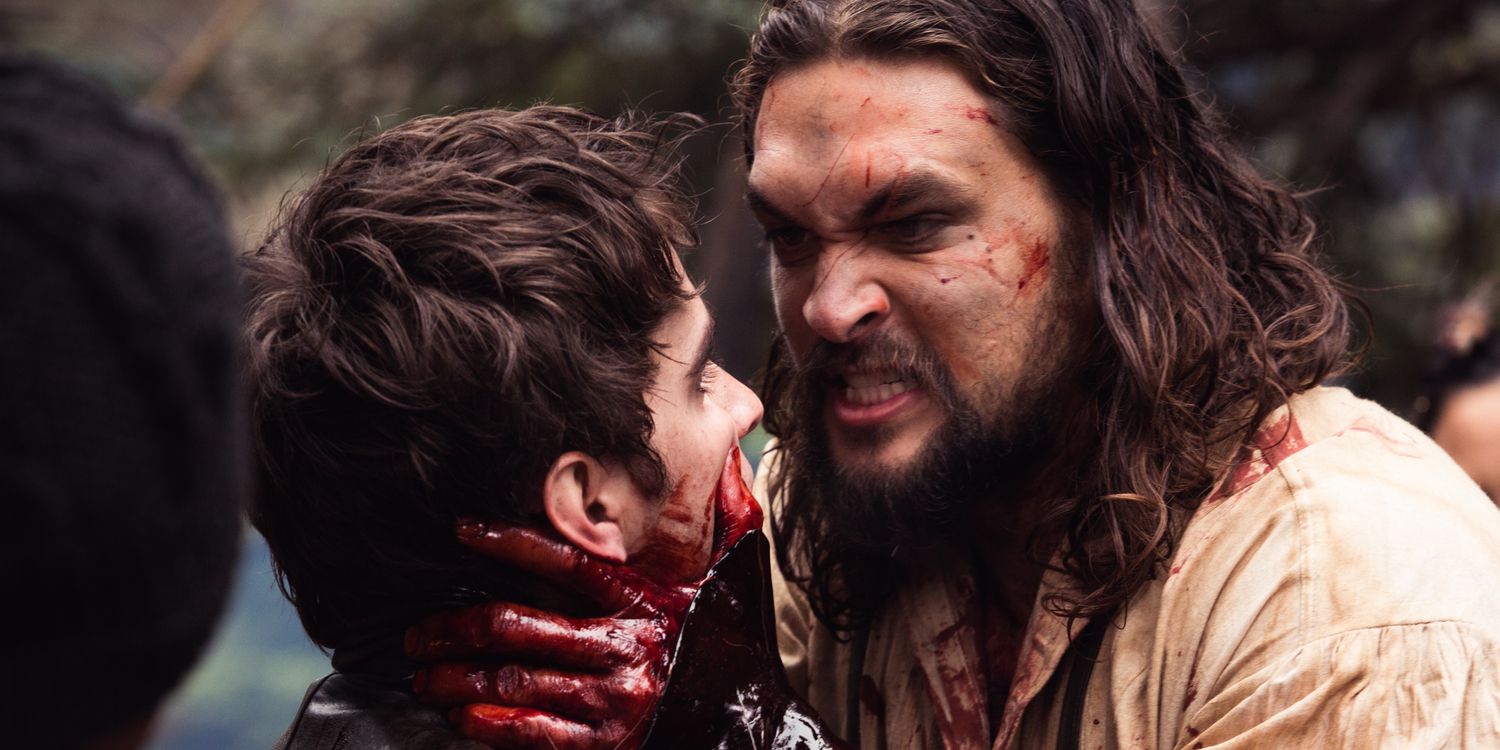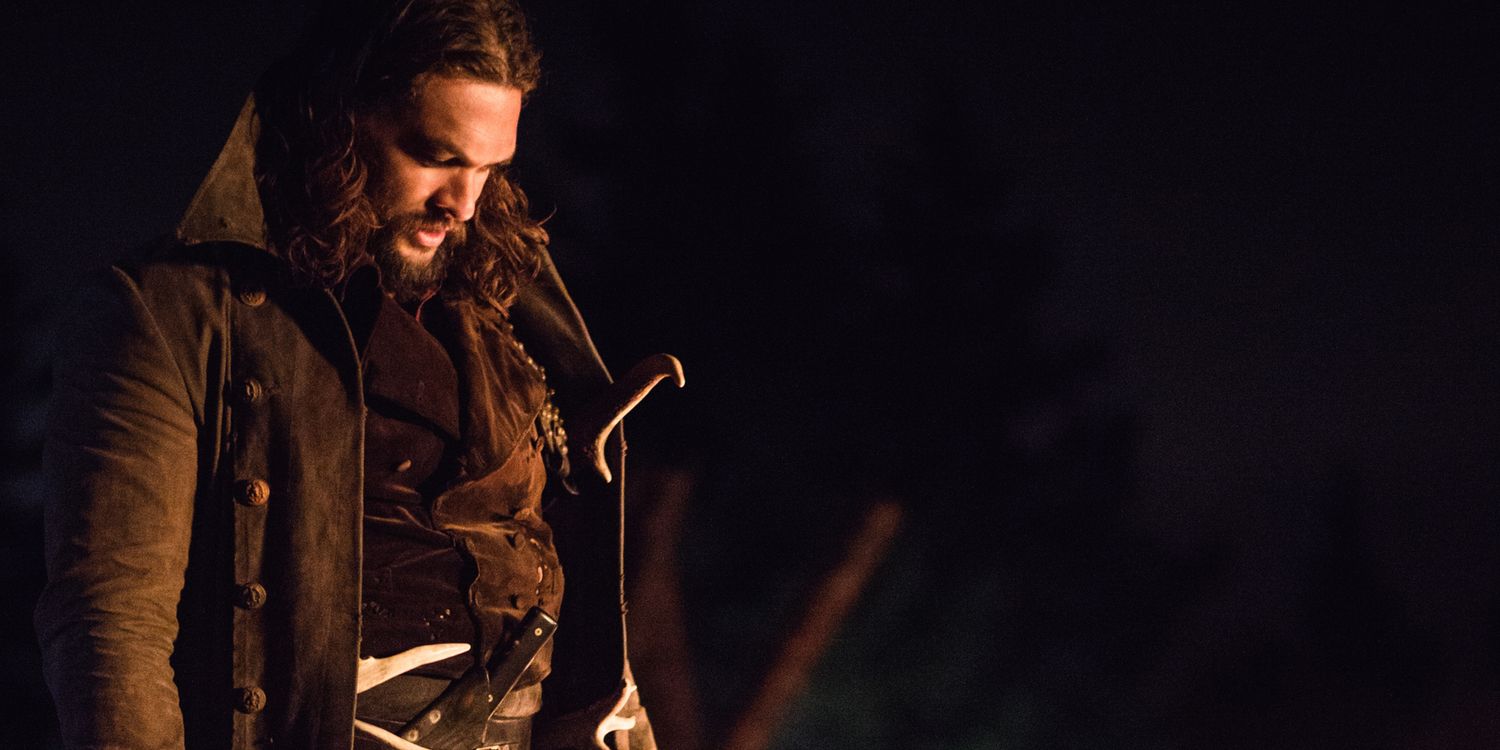At first glance, the similarities between FX's dark, Tom Hardy-led mumble-fest, Taboo, and Netflix's new period drama, Frontier, are too many to let pass without acknowledgement. Both feature brooding, enigmatic leads stalking around in long coats and invading the personal space of others – usually to kill them or threaten to kill them. That's easy enough to pass off, after all, though their careers are wildly different, Hardy and Frontier star Jason Momoa have on occasion displayed a similar on-screen disposition, or at least a predilection toward material affording them a chance to play menacing types with a fondness for tattoos, interesting facial hair, and who don't seem to mind being covered in blood. That's all well and good, but considering both series revolve around strikingly similar lead characters doing battle with monolithic British trading companies, you'd be forgiven for doing a double take.
Although Frontier aired late last year in the Great White North, its arrival in the United States roughly two weeks after Taboo premiered is really to Netflix's detriment. For one thing, Frontier doesn't enjoy a production design on the level of Taboo, and ends up looking like a cheap knockoff – though one likely wouldn't need to make such a specific comparison to reach the same conclusion. But the problems are more than skin deep: aside from the obvious constraints of its production, the series struggles to be compelling beyond the prospect of Momoa making an appearance on screen, and even then, the material rarely rises to meet the effort he puts forth.
This is immediately made clear in the first hour, which chooses to introduce Momoa's Declan Harp in the process of executing three British soldiers before jumping halfway around the globe to introduce a group of supporting characters whose sole motivation is to find and interact with, you guessed it: Declan Harp. It's an odd choice, as it underlines again and again the importance of a character on whom the entire narrative hinges, but is nowhere to be seen for the majority of the hour. Time and time again, supporting players take to discussing Harp, outlining how dangerous he is and the unique threat he represents to the Hudson Bay Company's fur trade. These conversations are, unsurprisingly, long and drawn out, and often do little to flesh out the identity of who is talking. By now the formula of "show don't tell" has likely been drilled into most viewers' brains, but for whatever reason, Frontier has chosen to spend the make-it or break-it first hour telling people why the most interesting person on the show is so interesting, rather than offering him a chance to demonstrate why that's true.
Instead, the series turns its attention to Michael Smyth (Landon Liboiron) a petty thief with stained teeth and a snazzy leather jacket, who conveniently stows away on a Hudson Bay ship after attempting to steal a keg of gunpowder. During the journey, a conniving cook discovers Smyth before his own misdeeds lead to a fatal encounter in which the young lad saves the life of Lord Benton (Alun Armstrong), a Hudson Bay bigwig with a mad-on for Harp and a psychotic lackey played by Allan Hawco. Through the magic of narrative necessity, Smyth winds up in Benton's employ, and is sent to sniff out Harp's location so that he can be dealt with and the Hudson Bay Company can continue its business without interruption.
Smyth's journey in North America finds him taking on a strange partner in Father Coffin (Christian McKay), a crooked priest with a penchant for ale, thievery, and busty tavern girls. Smyth's character is essentially a cipher designed to guide the story by reacting to everything around him, while Coffin works as an exposition machine, explaining the way the world works and diverting attention away from the task at hand so that Harp can be reintroduced in the episode's closing moments, dripping with blood and radiating menace. In short, the first hour feels like a first draft – or worse yet, a direct reading from the series' character bible. At any rate, it would have made a terrific training exercise for an inexperienced editor, as the excessive amounts of information would have been more entertaining if doled out in conjunction with, say, the series' main character actually being present and accounted for.
Even though it ends up working to the detriment of the series overall, the early emphasis on Smyth, Coffin, and Benton is understandable. Given that Harp is an immediately engaging personality, Frontier is betting the promise of his future participation will be enough to tide audiences over while it establishes the supporting cast. The problem is, none of the other characters are all that interesting, and, like Taboo, the machinations of a centuries-old trading company only conveys so much intrigue before something has to give. Thankfully, Harp's role is expanded considerably in the second episode and beyond, but even then, the series never quite finds its niche outside of featuring the once and future king of Atlantis. For all its faults, Taboo is at least willing to be peculiar, even destructively so at times; Frontier never quite manages to find such a distinction.
-
Frontier season 1 is available in its entirety on Netflix.


